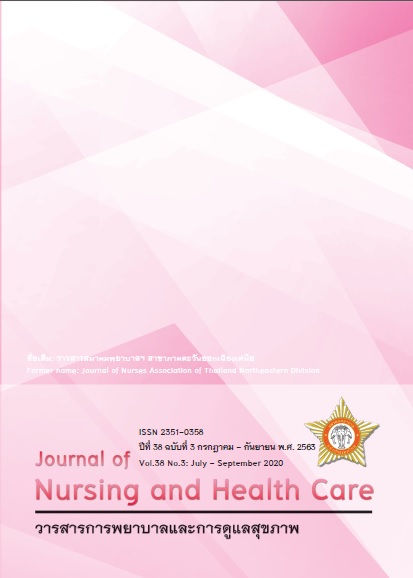การรับรู้สมรรถนะในการดูแลแบบประคับประคองของพยาบาลวิชาชีพระดับพยาบาลใหม่ที่ทำงานในโรงพยาบาลตติยภูมิ สังกัดกระทรวงสาธารณสุข
คำสำคัญ:
การรับรู้สมรรถนะ พยาบาลวิชาชีพ การดูแลแบบประคับประคองบทคัดย่อ
บทคัดย่อ
การวิจัยเชิงบรรยายครั้งนี้มีวัตถุประสงค์เพื่อศึกษาการรับรู้สมรรถนะในการดูแลแบบประคับประคองของพยาบาลวิชาชีพระดับพยาบาลใหม่ที่ทำงานในโรงพยาบาลตติยภูมิ สังกัดกระทรวงสาธารณสุข จำนวน 147 ราย เก็บรวบรวมข้อมูลตั้งแต่เดือนมีนาคม-พฤษภาคม พ.ศ. 2562 โดยใช้แบบสอบถามข้อมูลส่วนบุคคล และแบบสอบถามด้านสมรรถนะการดูแลผู้ป่วยแบบประคับประคอง วิเคราะห์ข้อมูลโดยใช้สถิติบรรยาย
ผลการวิจัยพบว่ากลุ่มตัวอย่างมีอายุเฉลี่ย 24.1 ปี มีระยะปฏิบัติงานเฉลี่ย 19.5 เดือน ร้อยละ 59.2 มีประสบการณ์การดูแลผู้ป่วยแบบประคับประคองจำนวน 5-10 ราย กลุ่มตัวอย่างมีคะแนนความมั่นใจเฉลี่ยในการดูแลผู้ป่วยแบบประคับประคองโดยรวมเท่ากับ 2.54 (0-5) ซึ่งอยู่ในระดับปานกลาง ด้านที่มีคะแนนความมั่นใจเฉลี่ยมากที่สุดคือ การจัดการอาการปวดและอาการรบกวน มีคะแนนความมั่นใจเฉลี่ยเท่ากับ 2.72 ส่วนด้านที่มีคะแนนความมั่นใจเฉลี่ยน้อยที่สุดคือ การดูแลภาวะเศร้าโศกและการสูญเสีย มีคะแนนความมั่นใจเฉลี่ยเท่ากับ 2.44
ผลการศึกษาครั้งนี้สามารถนำไปวางแผนเพื่อเป็นแนวทางในการจัดอบรม สัมมนาเกี่ยวกับการดูแลแบบประคับประคอง เพื่อพัฒนาสมรรถนะในการดูแลผู้ป่วยแบบประคับประคองให้ได้อย่างมีประสิทธิภาพ
Downloads
เอกสารอ้างอิง
2. Khunthar A, Kedcham D, Sawaengdee K, Theerawit T. Job Transfers amongst Registered Nurses in Thailand. Thai Journal of Nursing Council 2014; 28(3): 19-31.
3. Benner P. Excellence and power in clinical nursing practice. Chapter 1984; 14: 207-220.
4. Albutt G, Ali P, Watson R. Preparing nurses to work in primary care: educators' perspectives. Nursing Standard 2013; 27(36).
5. Pokpalagon P. Palliative Care Model in Thailand. Nursing Journal of the Ministry of Public Health 2017; 26(3): 41-51.
6. Pattniboon W, Pratunon J, Kaewmafai J. Model Development of Palliative care for elderly with end Stage chronic illnesses at Medical Unit II, Roi Et Hospital. Journal of Nursing and Health Care 2013; 30(3): 68-77.
7. Thaland Nursing and Midwifery Council. Palliative Nurse Specialist Competencies. Bangkok; 2014.
8. Siripukdeekan C, Boonrubpayap B. Nursing Career Ladder Development. Journal of the Royal Thai Army Nurses 2014; 15(3): 75-80.
9. Desbiens J-F, Fillion L. Development of the palliative care nursing self-competence scale. Journal of Hospice & Palliative Nursing 2011; 13(4): 230-241.
10. Loknimith W. Self-perceiving in Palliative Care Competencies of Professional Nurses after Receiving Bachelor Degree Less than Two Years in a University Hospital. [Master Thesis of Nursing Science]. Bangkok: Mahidol University; 2018.
11. Wongrattana C. Statistic Technique for Educational Research. Bangkok: Books Centre, Chulalongkorn University; 2017.
12. Nguyen LT, Yates P, Osborne Y. Palliative care knowledge, attitudes and perceived self-competence of nurses working in Vietnam. International journal of palliative nursing 2014; 20(9): 448-456.
13. Makaraphirom A, Karawanih A. The Effects of the End of Life Care Program on Nurse’ Self Efficacy and Holistic Care for End of Life Patients. The Journal of Prapokklao Hospital Clinical Medical Education Center 2015; 32(4): 348-363.
14. Akarathanarak T, Kongsuwan W, Matchim Y. New Registered Nurse Knowledge in Caring for Patients at the End of Life. Songklanagarind Journal of Nursing 2014; 34(2): 103-116.
15. Nuekwen P, Hanprasitkam K, Junda T. Nurses’ perceptions and practice on palliative care. Thai Journal of Cardio-Thoracic Nursing ISSN 2672-9474 (Online) 2016; 27(1): 128-141.
16. Jamjan Laiad, Chaleoykitti S. Trend of Palliative Care in the Bachelor of Nursing Science Curriculum. Journal of the Royal Thai Army Nurses 2017; 18(1): 22-28.
17. Rush KL, Adamack M, Gordon J, Lilly M, Janke R. Best practices of formal new graduate nurse transition programs: An integrative review. International journal of nursing studies 2013; 50(3): 345-356.
18. Akarathanarak T. Novice Nurses’ Preparedness, Knowledge and Caring Behavior for Patients at the End of Life. [Master Thesis of Nursing Science]. Songkla: Prince of Songkla University; 2014.
19. Srisuwan N, Matchim Y, Nilmanat K. Nurses' Competency in Communication with Patients at the End of Life and Their Families and Related Factors. Songklanagarind Journal of Nursing 2014; 34(3): 109-124.
20. Ferrell B, Malloy P, Mazanec P, Virani R. CARES: AACN's New Competencies and Recommendations for Educating Undergraduate Nursing Students to Improve Palliative Care. Journal of Professional Nursing 2016; 32(5): 327-333.
21. Phengjard J. NURSE’S ROLE IN PALLIATIVE CARE. Journal of Boromarajonani College of Nursing 2014; 30(1): 100-109.
22. Nupinit W. Relationships between Selected Factors and ICU Nurses’ Competency for Caring of Patients at the End of Life. [Master Thesis of Nursing Science]. Songkla: Prince of Songkla University; 2016.
ดาวน์โหลด
เผยแพร่แล้ว
รูปแบบการอ้างอิง
ฉบับ
ประเภทบทความ
สัญญาอนุญาต
ลิขสิทธิ์ (c) 2020 วารสารการพยาบาลและการดูแลสุขภาพ

อนุญาตภายใต้เงื่อนไข Creative Commons Attribution-NonCommercial-NoDerivatives 4.0 International License.



